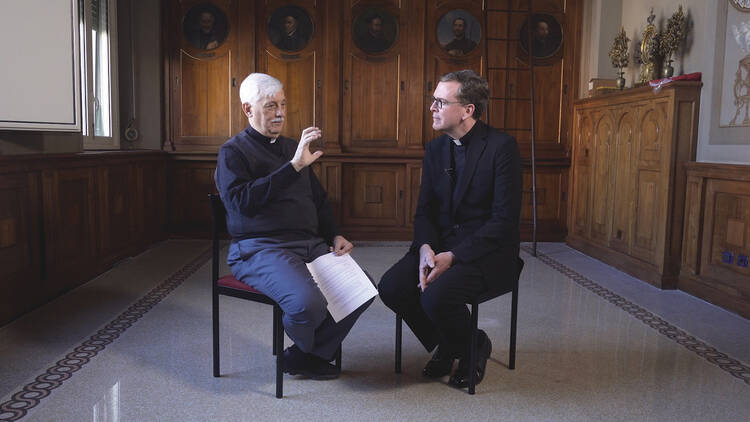In a world of conflict, deeply in need of the mercy frequently implored by Pope Francis, Jesuits can be agents of reconciliation and dialogue, the Society’s new superior general said in an exclusive interview with America.
Arturo Sosa, S.J., elected on Oct. 14 superior general for the Society of Jesus, told America’s editor in chief, Matt Malone, S.J., that he believes the far-flung Jesuits can be models of discernment, adaptability and “the very rich experience of...multiculturality” for the church and the world, especially in those regions of conflict where Jesuits are present.
He spoke with Father Malone in Rome on Nov. 28.
Father Sosa, born in Caracas, Venezuela, in 1948, is the first Jesuit from Latin America to be elected to the office, which is usually a lifetime position. His election comes as the church is experiencing its first Latin American pope. He suggests this historic moment represents an invitation “to see the Latin American church” and the progress it has made since the Second Vatican Council (1962-65).
“Jorge Mario Bergoglio—Pope Francis—and myself, we’re sons of a church and a living church. The Latin American church has made a very nice process after Vatican II. We were formed in that process—the pope and myself—in different points in Latin America.”
That mutual historical experience, he said, “takes very seriously the faith of the people...takes very seriously the community life as the base of the church life, takes very seriously the respect for the other and very seriously tries to make the social justice a practical commitment of the church, of the society.”
A Jesuit pope creates special opportunities and connections for the Society to be of service to the whole church, Father Sosa said, “because [Pope Francis] knows and he practices very well the Ignatian spirituality. He talks all the time about that—about discernment, about consolation, about desolation, about reconciliation.”
“And also he is a person very committed to the Vatican II view of the church,” the father general added: “all the synodality—[that] this is a co-responsibility.”
“This is a man who understands very well the role of the religious life in the church. So for the Society it’s really an opportunity to be used.”
On Nov. 26, just a few days before the two Jesuits spoke in Rome, a former superior general, Peter-Hans Kolvenbach, S.J., passed away in Lebanon.
Father Kolvenbach had accepted in 1983 the burden of leading the Society during a time of strained relations with the pope at the time, John Paul II. Describing the late Father Kolvenbach as both “father and brother” to him, Father Sosa said he would be remembered for his openness to dialogue and his sensitivity during a difficult time. “He made this kind of tension between being in fidelity to the pope and being in fidelity to the discernment of the Society about the mission of faith and justice.” He added that the late father general “opened the Society” to dialogue with other cultures. “He was very aware of the importance [of other traditions]—different from the Latin tradition—in the church.
After the shock of being elected superior general, he said, he quickly came to feel at peace with the decision of his brother Jesuits, partly because of his confidence in the system of discernment applied by Jesuits to the election.
“It’s a time of praying, of discernment, of dialogue among the electors,” he said. He described it as a deeply spiritual experience, of “being in the hands of God.”
“If we take seriously that the Spirit talks in the election...that gives me peace,” he said. “It was not my desire; it was not my plan; I didn’t want to do that. So it’s really like a call from the Spirit through my brothers, the Society.”








